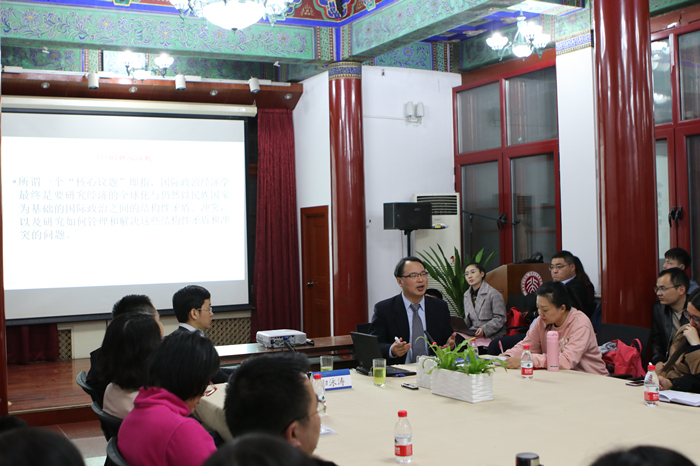
On the evening of March 21, 2019, the Institute of International & Strategic Studies (IISS), Peking University (PKU) held the 31st "North Pavilion Dialogue" series lecture. Wang Yong, Professor of the School of International Studies (SIS) and Director of the Center for International Political Economy, PKU, gave a lecture titled "Political Economics of China-U.S. Trade War – Origin, Negotiations and Influence." The lecture was hosted by Gui Yongtao, Vice President of the IISS and Vice President of the SIS, PKU.
After raising the question – "why did a trade war break out between natural trading partners like China and the U.S.", Prof. Wang Yong first discussed the China-U.S. economic and trade relations from the perspective of international political economics focusing on interaction between international economy and international political (power) relations, and explained how to judge the characteristics of China-U.S. economic and trade consultations and the strategies for the negotiation of economic and trade agreements between the two countries from the basic laws and core issues of the discipline.
Prof. Wang then analyzed the impetus of the China-U.S. trade war. He believed that the U.S.' tactics of attacking China repeatedly with an ever more stringent tariff requirement for the first time in years manifests its unilateralist policy and the tactic is also influenced by the personality of U.S. President Donald Trump. In addition, the factors such as competition between powers and changes in China's diplomatic style has further spurred the U.S. on launching a trade war against China.
Prof. Wang pointed out that Section 301 actually has the expectation of "killing three birds with one stone": the U.S. has demanded for a substantial reduction in the U.S. trade deficit with China and improved market access for U.S. companies in China, and demanded that China changes its current policy of subsidizing emerging industries. Since May 2018, China and the U.S. have conducted seven rounds of negotiations, and the process has been tortuous. As can be seen from the content of the published agreement reached in the seventh round, the key implementation mechanisms for the agreement have not yet been finalized by the two sides, and China has insisted that the agreement shall be fair and shall bind both sides. Prof. Wang concluded that the two countries are highly likely to reach an economic and trade agreement, and economic and trade relations will continue to play the role of "ballast stone" and "stabilizer" in China-U.S. relations. The agreement will also have an impact on WTO reform and the global governance system.
In the question-and-answer session at the end of the lecture, Prof. Wang had in-depth exchanges and discussions with the teachers and students on issues such as comparison of the U.S.-Japan trade friction with the current China-U.S. trade war, current situation of China-U.S. people-to-people exchanges, position of the U.S.'s moderate vis-à-vis China, and trade wars between the U.S. and other countries. (Contributed by Zeng Chuyuan)
Editor: Li Fangqi Photographer: Sun Yilin

